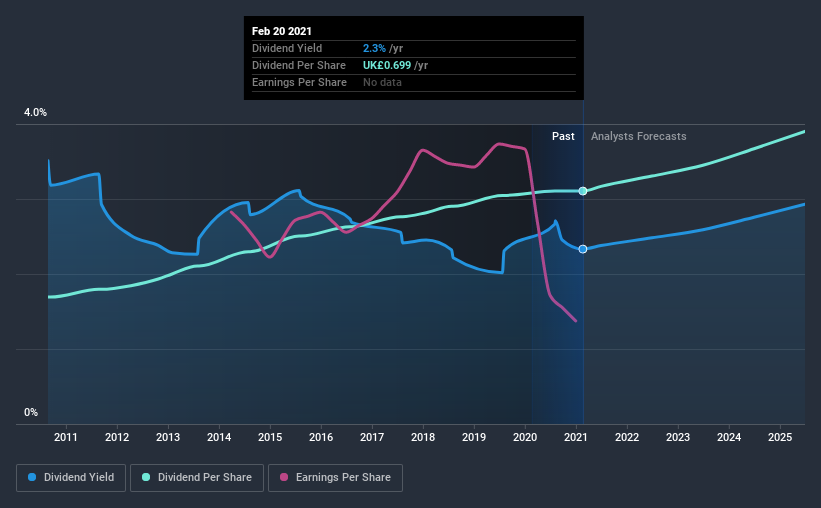Don't Buy Diageo plc (LON:DGE) For Its Next Dividend Without Doing These Checks
Diageo plc (LON:DGE) is about to trade ex-dividend in the next three days. You can purchase shares before the 25th of February in order to receive the dividend, which the company will pay on the 8th of April.
Diageo's next dividend payment will be UK£0.28 per share, and in the last 12 months, the company paid a total of UK£0.70 per share. Last year's total dividend payments show that Diageo has a trailing yield of 2.3% on the current share price of £29.965. We love seeing companies pay a dividend, but it's also important to be sure that laying the golden eggs isn't going to kill our golden goose! So we need to check whether the dividend payments are covered, and if earnings are growing.
See our latest analysis for Diageo
Dividends are typically paid out of company income, so if a company pays out more than it earned, its dividend is usually at a higher risk of being cut. Diageo distributed an unsustainably high 146% of its profit as dividends to shareholders last year. Without extenuating circumstances, we'd consider the dividend at risk of a cut. That said, even highly profitable companies sometimes might not generate enough cash to pay the dividend, which is why we should always check if the dividend is covered by cash flow. It paid out more than half (68%) of its free cash flow in the past year, which is within an average range for most companies.
It's disappointing to see that the dividend was not covered by profits, but cash is more important from a dividend sustainability perspective, and Diageo fortunately did generate enough cash to fund its dividend. If executives were to continue paying more in dividends than the company reported in profits, we'd view this as a warning sign. Extraordinarily few companies are capable of persistently paying a dividend that is greater than their profits.
Click here to see the company's payout ratio, plus analyst estimates of its future dividends.
Have Earnings And Dividends Been Growing?
Businesses with shrinking earnings are tricky from a dividend perspective. Investors love dividends, so if earnings fall and the dividend is reduced, expect a stock to be sold off heavily at the same time. Readers will understand then, why we're concerned to see Diageo's earnings per share have dropped 13% a year over the past five years. When earnings per share fall, the maximum amount of dividends that can be paid also falls.
Many investors will assess a company's dividend performance by evaluating how much the dividend payments have changed over time. Diageo has delivered an average of 6.3% per year annual increase in its dividend, based on the past 10 years of dividend payments. That's intriguing, but the combination of growing dividends despite declining earnings can typically only be achieved by paying out a larger percentage of profits. Diageo is already paying out a high percentage of its income, so without earnings growth, we're doubtful of whether this dividend will grow much in the future.
To Sum It Up
From a dividend perspective, should investors buy or avoid Diageo? It's never fun to see a company's earnings per share in retreat. Worse, Diageo's paying out a majority of its earnings and more than half its free cash flow. Positive cash flows are good news but it's not a good combination. It's not that we think Diageo is a bad company, but these characteristics don't generally lead to outstanding dividend performance.
With that being said, if you're still considering Diageo as an investment, you'll find it beneficial to know what risks this stock is facing. Every company has risks, and we've spotted 6 warning signs for Diageo (of which 1 can't be ignored!) you should know about.
We wouldn't recommend just buying the first dividend stock you see, though. Here's a list of interesting dividend stocks with a greater than 2% yield and an upcoming dividend.
This article by Simply Wall St is general in nature. It does not constitute a recommendation to buy or sell any stock, and does not take account of your objectives, or your financial situation. We aim to bring you long-term focused analysis driven by fundamental data. Note that our analysis may not factor in the latest price-sensitive company announcements or qualitative material. Simply Wall St has no position in any stocks mentioned.
Have feedback on this article? Concerned about the content? Get in touch with us directly. Alternatively, email editorial-team (at) simplywallst.com.

